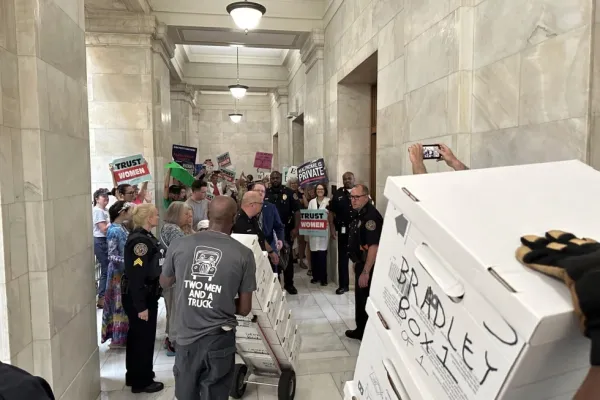
Lawsuit Challenges Arkansas Ballot Initiative Restrictions \ TezzBuzz \ Washington DC \ Mary Sidiqi \ Evening Edition \ A lawsuit filed by the League of Women Voters of Arkansas seeks to overturn multiple laws restricting the ballot initiative process. The group argues that these laws infringe on constitutional rights and obstruct citizen-led petition efforts. Arkansas officials say the laws are needed to prevent fraud and ensure accountability.
A new legal challenge could reshape Arkansas’s ballot initiative landscape. On Monday, the League of Women Voters of Arkansas filed a federal lawsuit asking the court to strike down several recent and existing restrictions on the citizen-led petition process, arguing that they represent an unconstitutional infringement on voter rights.
The case, which was filed in federal court, is backed by Save AR Democracya civic organization advocating for expanded protections for the state’s referendum system. It comes as part of a broader national trend of Republican-led legislatures tightening rules on ballot initiativesoften citing concerns over fraud or outside influence.
At the heart of the lawsuit is the claim that Arkansas’s rules “interfere, restrict, hamper, and impair the freedom of the people” to engage in the political process.
The lawsuit challenges four newly enacted lawsas well as existing procedural requirements that plaintiffs say create unfair barriers to participation:
Together, these provisions form what the lawsuit calls an “unconstitutional patchwork of barriers” to democratic engagement. The group argues that these laws were designed not to protect the process, but to deter citizen participationparticularly on politically sensitive issues such as abortion rights, voting reform, and term limits.
Arkansas officials were quick to defend the laws. Attorney General Tim Griffin’s office is reviewing the case and preparing for a legal defense. Meanwhile, Secretary of State Cole Jester issued a statement calling the challenged laws “basic, common-sense protections.”
Jester emphasized that the rules aim to increase transparency and accountability in the signature-gathering process—particularly as outside advocacy groups increasingly target Arkansas and other Southern states for progressive or controversial ballot efforts.
The legal fight comes on the heels of several recent failed petition efforts in Arkansas, most notably an attempt to place an abortion rights amendment on the ballot last year. That campaign fell short after the state’s election commission rejected the submitted signaturesciting compliance issues.
More broadly, Arkansas voters rejected attempts to restrict the initiative process in 2020 and 2022when Republican-backed ballot measures aimed at increasing signature thresholds and geographic requirements were defeated at the polls.
The lawsuit argues that lawmakers are now attempting to bypass the will of voters by enacting legislative restrictions that echo those previously rejected in public referenda.
Arkansas is not alone. Over the past five years, states like Florida, Missouri, Ohio, and South Dakota have introduced similar restrictions targeting the ballot initiative process. Critics argue these efforts are intended to reduce citizen influence over legislationespecially on issues where public opinion diverges from legislative majorities.
Ballot initiatives have been used by voters to enact marijuana legalization, expand Medicaid, increase minimum wagesand protect reproductive rights—often bypassing more conservative state legislatures.
Supporters of restrictions, on the other hand, say reforms are needed to prevent manipulation of the process by well-funded outside organizations.
The case will proceed in federal courtwith both sides expected to present evidence on the constitutional balance between election integrity and voter access. Legal experts say the case could set precedent not just for Arkansas, but for other states with similar laws.
If successful, the lawsuit could roll back many of the restrictions currently hindering petition drives in Arkansas—and potentially restore easier paths to the ballot for grassroots campaigns.
With tensions rising over abortion rights, electoral reform, and citizen powerthe future of direct democracy in Arkansas may now be decided in a courtroom.
More on US News
Lawsuit Challenges